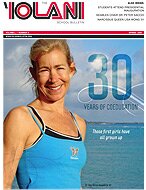This Issue

Life was different back then. George Ariyoshi presided as Governor. Kalapana recently released Many Classic Moments. Bobby McGee’s was Waikiki’s hot spot. And ‘Iolani was a school for boys.
Read the full story »
Spring 2009 - Department | Headmaster’s Column
The Headmaster’s Column

When parents keep saying and signaling, “I just want you to be happy,” they send dangerous signals and set unrealistic expectations that life is supposed to be one continuous rush towards Nirvana.
- Patrick Bassett, President
National Association of Independent Schools
In a recent article entitled “When School and Parents Align,” Mr. Bassett provides sound advice to parents and educators. I am struck by how many of his insights apply to ‘Iolani School.
In choosing a school, parents should place a high value on their child’s peers.
Mr. Bassett notes that one of the most essential drivers of student and school achievement [is] the peer group and kid culture at a school. I agree wholeheartedly. A child’s peers have significant influence over the behavior patterns, perspectives, attitudes and values that children develop during their early years and in adolescence. Parents cannot predict friendships, and they should not try to insist on a particular peer group for a child, but they should be aware of the distinctive and pervasive culture that exists at a school. Are students well behaved? Is academic achievement highly valued? Do students treat adults and each other with kindness and respect? What activities, in and out of school, are engaging the students? Is socio-economic status important?
Too little parenting is selfish and irresponsible; too much parenting is unhealthy.
Finding the balance between establishing boundaries for a child and allowing that child sufficient freedom to make choices can be a daunting task. Bassett notes: the more a child is involved in salubrious activities – sports, arts, student government, etc. – the less direct parenting you need to do...since those activities tend to self-organize a child's time and interest. It’s not easy for kids to make good choices, to take responsibility for their actions and to fight their own battles, but such challenges are all part of preparation for adulthood. What better time to practice these skills than when under the supervision of parents and other adults?
To prepare children for school, parents should read with them often.
We all know it can be tough for parents, after a long work day, to engage children in meaningful verbal activities such as reading and conversation. But, Mr. Bassett writes, the research is clear: students from family environments where books and newspapers and other publications are part of daily life – where kids regularly see parents reading and engaging in discussions on what they read – end up as the most verbally accomplished students. Academic success and high achievement in the work world depend on verbal skills. It is never too early (or too late) to start reading to and with children.
Focus on helping your child to be “good.” Happiness will follow.
Mr. Bassett refers to surveys which indicate differences among cultures when asked to finish the statement: “I want my child to be ________.” A Japanese mother will typically complete the sentence with “successful.” An American mother will use the word “happy.” But Bassett suggests that children [would be] better served if parents complete the sentence, “I want my child to be… good.” Research shows that the pursuit of success or happiness often leads to neither, but that young people who seek to be good end up, disproportionately, successful and happy. Both work and fun are vital parts of our lives; it is no wonder, therefore, that people who have a healthy dose of each, and who are engaged in meaningful and worthwhile activities, are often the most successful and the happiest.
Encourage your child’s school to be experimental and innovative.
Change is sometimes difficult, but it is essential to stay current with advances in technology and to equip children to live in a world that continues to evolve in interesting and often unexpected ways. Mr. Bassett writes: Schools that seek to change, especially those steeped in tradition, face huge resistance from their faculties and parents; the natural conservative nature of education militates against experimentation and innovation. We must be prudent when we institute new ideas or practices, but schools can either take advantage of change or be victims of it.
As Mr. Bassett says at the outset, simply hoping for happiness will not lead us or our children to Nirvana. But we may take some small steps toward enlightenment by heeding a wise man’s suggestions.

